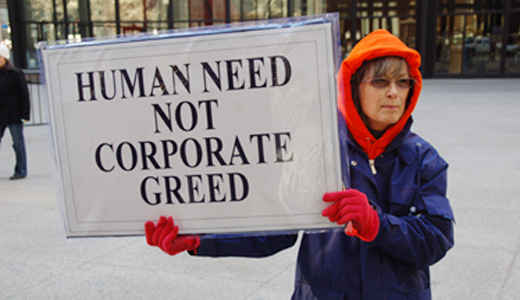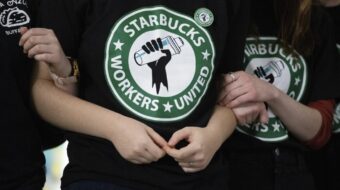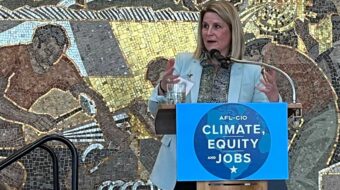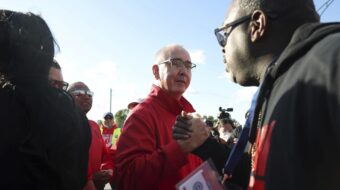
MADISON, Wis. – There’s a bank in the Midwest that still hasn’t repaid its federal bailout loan, that is notorious for selling its customers’ personal information without their consent and that gave Republican Governor Scott Walker even more money for his election campaign than he got from the Koch brothers.
The Marshall & Ilesley Bank, the largest in this state, with branches throughout the Midwest has, for all of its misdeeds, become the target of both the Sheet Metal Workers here and their union brothers and sisters across the border in Canada.
The union campaign against M&I bankers aims to accomplish two things: Reverse its sale to a bigger bank in Canada and get as many people as possible to withdraw their money from M&I.
Millions in Canada watched on television news March 22 as union members mobilized by the British Columbia Federation of Labor paraded into the annual meeting of the Bank of Montreal in Vancouver, British Columbia to oppose that institution’s purchase of M&I.
The following day, March 23, there were union rallies and marches at M&I branches in Wisconsin, the Twin Cities and Kansas City. Union members and their supporters at the rallies were angry about a long list of things they say the bank has done to hurt working families.
First, they noted that campaign finance records show M&I executives stuffed $46,308 into the successful gubernatorial campaign of the tea party-backed Walker who has made himself into a leader of a national Republican effort to strip workers of their rights, particularly their collective bargaining rights.
Half of all the money M&I put into political campaigns last year went to Walker, and the M&I banker executives were his biggest corporate contributors. The Koch brothers, the infamous anti-union oil billionaires from Kansas City, were the second biggest, with $43,000. That figure, however, does not include millions of dollars they spent on attack ads against Walker’s Democratic opponent.
Second, the Sheet Metal Workers note, M&I executives organized a June 22, 2010 fundraiser for Walker where other corporate kingpins joined them and “bundled” together large amounts of money for Walker. Such “bundling” of campaign money is allowable ever since the Supreme Court ruled in favor of unlimited corporate contributions and allows individual donors to remain anonymous.
Particularly irksome to the Sheet Metal Workers and the rest of the labor movement is the fact that people in attendance at that June 22 fundraiser say that it was there that Walker revealed his plans to strip workers of their collective bargaining rights. Throughout the remainder of his campaign, he never mentioned those plans again.
Third, the union members are also angry at the bank because M&I, despite privacy laws, is apparently selling its customers’ private information to third parties, without their consent. “That’s what actually brought the Sheet Metal Workers into the battle,” said union spokesperson Paul Pimental.
“Buried in the fine print” of the agreement the bank makes its depositors sign “are details of how their privacy rights are being compromised,” a union fact sheet says.
“Deep inside a supplemental document is language that strips these rights and gives M&I the right to sell or give away some of the most intimate details of a customer’s banking life including information identifying the customer, their address, their assets and income, employment history, their medical information, information on accounts, transactions on those accounts and their use of the M&I website.”
Customer information can be turned over, without the customer’s knowledge or consent, to the IRS, credit bureaus, government agencies, M&I or other banks, and to undefined third parties, the union notes.
A fourth big issue for the union is that M&I borrowed $1.75 billion from the U.S. government’s Troubled Assets Relief Program (TARP) when the 2008 financial crisis exploded. The union notes that, unlike most banks that did the borrowing, M&I has failed to pay back a single penny.
The workers who marched into the Bank of Montreal meeting presented the execs there with all of these arguments and more.
They noted that if the Bank of Montreal purchases M&I it would be on the hook for the TARP money.
They condemned the sale to the Canadian bank because, under its terms, M&I CEO Mark Furlong would get an $18 million golden parachute while $65 million in severance pay would go to other M&I executives.
“Instead of rewarding these bank executives, the Bank of Montreal needs to examine and reverse the obscene level of compensation paid to M&I executives,” said Jim Sinclair, the British Columbia Federation of Labour president. Sitting next to him, as he made his appeal to the Canadian bank executives, were Betsy Kippers of the Wisconsin Education Association, Judy Darcy of the Canadian Hospital Employees and Marc Norberg of the Sheet Metal Workers.
Bank of Montreal Chairman David Galloway admitted the payments were “unusually high” but said his bank would have to honor the M&I executives’ contracts.
Union members then challenged Galloway on M&I support for Walker and his killing of collective bargaining rights for 200,000 Wisconsin public workers. Galloway sidestepped the entire issue of M&I’s role and responded only by saying, “I believe in collective bargaining.”
As for the union campaign to pull funds out of the bank: The Firefighters have already led an effort to do so at one M&I branch in Madison. M&I responded by closing the branch.
Jeff Skiles, the co-pilot in the famous miracle on the Hudson landing in January 2009, went into his M&I branch on March 22 nd and withdrew thousands of dollars from his accounts in solidarity with the unions.
Photo: Pepe Lozano/PW.












Comments